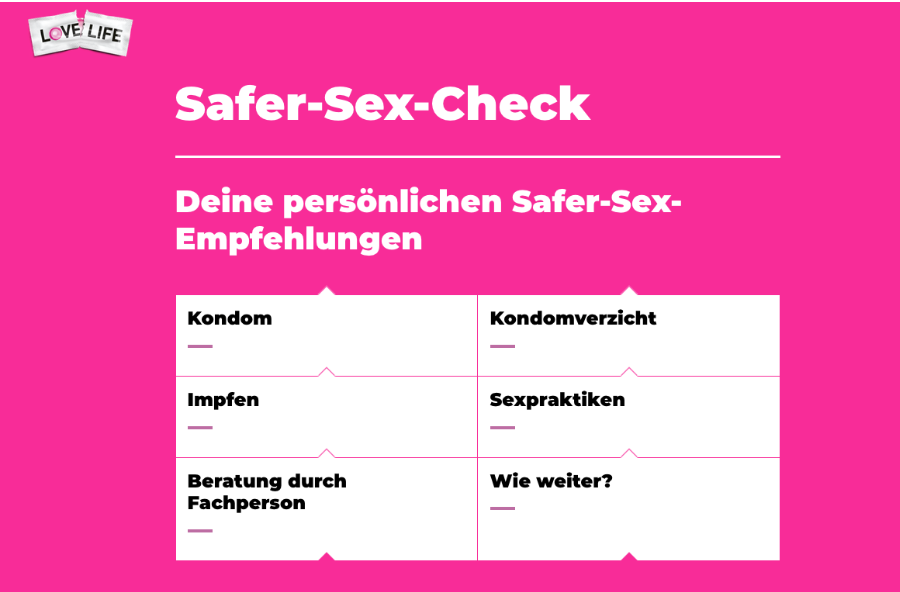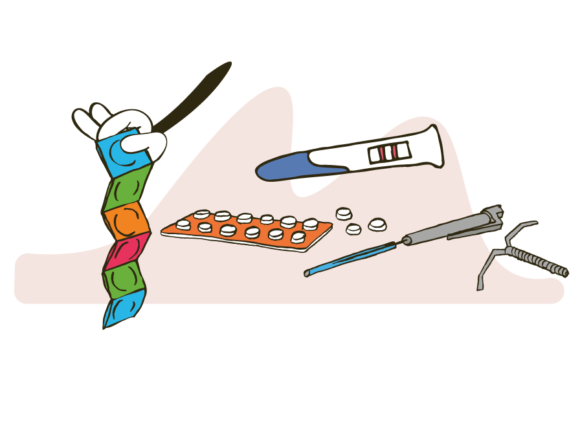1. you can protect yourself against HIV and other STIs with the safer sex rules
The Federal Office of Public Health FOPH sets the official safer sex rules in Switzerland. They currently consist of two points:
- Vaginal and anal sexA term derived from the Latin word anus (for anus) for sexual intercourse in which the penis is inserted into the anus. The anal region can be a sexually erogenous zone. Not everyone likes anal sex. It is a variant of sexual experience, not... with a condomAuch Präservativ genannt. Ein Kondom ist eine schlauchförmige Gummihülle, die über den Penis gestreift wird, um während des Geschlechtsverkehrs eine Barriere zu bilden und so eine Schwangerschaft und/oder die Übertragung von sexuell ...
- And because everyone loves it differently: do your personal safer sex check on lovelife.ch
After you have answered a few questions about your sex life during the safer sex check, you will be given personalized recommendations in the following categories:

2. condoms and other barriers offer good protection
CondomsAnother term for condom (also called Parisian or rubber)., femidoms, leaking cloths, latex gloves and lubricantsA lubricant is a liquid or cream that can be used to make it easier to insert a penis or sex toy into the vagina or anus, for example. Lubricants can be bought at the pharmacy or drugstore and make it easier to insert the penis, especially ... are various aidsAIDS is the abbreviation for Acquired Immunodeficiency Syndrome. HIV is a virus that damages the immune system and thus impairs the body's ability to protect itself against infections and diseases. If the HIV virus spreads in the body and t... to protect yourself from STIs during sex. The correct application of these barrier methods and the use of suitable lubricants help to reduce the risk of infectionHaving an infection or being infected means that you have contracted a pathogen. This can be a flu, herpes or HI virus, for example. and promote your sexual health.
Condom
Condoms are one of the most effective forms of protection against STIs. They form a barrier between the genitalsThis is the medical term for sexual organs. This refers to both the internal and external sexual organs. The external genitalia penis, scrotum and testicles are referred to as male genitalia. The vulva is referred to as the female genitalia... or the toyEnglish word for sex toys, includes e.g. dildos, vibrators, love balls, rings and much more. and significantly reduce the risk of STISTI is the abbreviation for "sexually transmitted infections". Sometimes only the abbreviation STI is used in specialist circles or in brochures. transmission. Condoms should be used correctly during every sexual intercourseIt is a technical term for "having sex" and specifically means when a penis penetrates a vagina or a vagina receives a penis. It refers to a sexual encounter between two or more people. In colloquial language, there are various expressions ..., whether vaginal or anal, to ensure optimal protection.
Femidom
The femidomThe femidom is also known as the female condom. It is a tube made of thin, tear-resistant plastic (polyethylene or polyurethane) that is inserted into the vagina before sexual intercourse and adapts to the inner wall of the vagina. This pre... is an alternative to the condom and also offers effective protection against STIs. It is a soft, thin pouch that is inserted into the vaginaobsolete word for vagina.. The femidom can be inserted before sex, so you can get down to business quickly.
Licking cloth
A dental dam is a thin latex or polyurethane sheet that is placed over the vulvaEntirety of the external female reproductive organs: mons veneris, external vulval lips, internal vulval lips, clitoral pearl, vestibule with the openings of the urethra and vagina. or anusAnus (also called anus) refers to the exit opening of the large intestine. Colloquially also called "asshole". to prevent direct contact during oral sexOral sex or oral intercourse is a sexual activity in which the aim is to give each other sexual pleasure by stimulating erogenous zones with the mouth (and throat area). This includes stimulation with the tongue, mouth and lips. See also cu.... If no dental dam is available, you can also cut a condom open lengthwise.
Latex glove
Latex gloves can be used to cover the hands during manual stimulationA foreign word for stimulation or arousal. Sexual stimulation refers to the actions or stimuli that make a person feel sexually aroused or excited. This can include a variety of activities, touches or visual stimuli that help to arouse sexu... or during vaginal and anal intercourseA term derived from the Latin word anus (for anus) for sexual intercourse in which the penis is inserted into the anus. The anal region can be a sexually erogenous zone. Not everyone likes anal sex. It is a variant of sexual experience, not.... They provide additional protection against infection and reduce the risk of STI transmission through skin contact or body fluids. On the one hand, it minimizes the risk of (micro)injuries from fingernails or if (micro)injuries are already present on the fingers/hand.
Lubricants
Lubricants aren't just great because they make everything go smoothly. They are also a valuable addition to protection against STIs. They reduce friction and increase comfort during sex. By reducing friction, the risk of micro-injuries to the skin, which can be the gateway for STIs, can be reduced. It is important to use a water- or silicone-based lubricantA lubricant is a liquid or cream that can be used to make it easier to insert a penis or sex toy into the vagina or anus, for example. Lubricants can be bought at the pharmacy or drugstore and make it easier to insert the penis, especially ..., as oil-based lubricants can damage latex condoms.
3. find out more about STIs
There are many myths about HIV and STIs. In addition to our own detailed fact sheet on STIs, we have other trustworthy sources where you can find information on the subject. You can also use the following link to find advice centers in your area where you can get free personal advice. Or get in touch with our Sexpert chat.
- LoveLove is a strong feeling of emotional and often physical attraction to another person. It can manifest itself in various forms, such as romantic love or love for friends and family. Ideas and experiences of love and relationships develop du... Life (www.lovelife.ch): Love Life is a Swiss platform for sexual health and offers extensive information on STIs, safer sex, contraceptiveContraceptives are measures that can help to prevent unwanted pregnancies. Most contraceptives must be taken by girls or people with a uterus. Depending on the product, safety is more or less guaranteed. No method is 100% safe. methods and much more. The website also includes the Safer Sex Check, which provides personalized recommendations.
- Pro Familia (www.profamilia.de): Pro Familia is a German organization that offers advice and information on sexual and reproductive health.
- Jugend gegen AIDS (www.jugend-gegen-aids.de): Jugend gegen AIDS is a German youth initiative that promotes education and prevention of HIV and other STIs.
- SEXUELLE GESUNDHEIT SCHWEIZ (www.sexuelle-gesundheitschweiz.ch) SGCH is the Swiss umbrella organization for all specialist units for sexual health in education and counseling and offers, among other things, the brochure sex etc. on STIs.
4. there are vaccinations and medication that protect against STIs.
To protect yourself against HPVHPV stands for human papillomavirus. It is a virus that can be transmitted through sexual contact. There are many different types of HPV, some of which are harmless and cause no symptoms, while others can lead to various health problems. So..., hepatitisHepatitis is a disease that attacks the liver. There are different types of hepatitis, such as hepatitis A, B and C. Symptoms can include fatigue, yellowing of the skin and eyes, nausea and pain in the abdomen. There are vaccines and medica... B and HIV, it is possible to protect yourself against infection with vaccinations or medication.
Vaccinations play an important role in protecting against hepatitis B and HPV (human papillomavirus), both of which are sexually transmitted. The hepatitis B vaccine protects against a viral infection that can lead to chronic liver disease. The HPV vaccine protects against various strains of the virus that can cause genital wartsGenital warts are skin lesions that usually appear in the genital area (vulva, vagina, penis, anus) in the form of small warts. They are caused by sexually transmitted viruses (human papillomaviruses, HPV) and are sexually transmitted infec... and are associated with cervical, laryngeal and other cancers.
There are also medications that protect against HIV infection. So-called pre-exposure prophylaxis (PrEP) for HIV. PrEP involves the regular intake of antiretroviral medication by people who are at high risk of HIV infection. These drugs can inhibit the replication of the virus in the body and significantly reduce the risk of HIV infection.
Neither vaccinations nor prophylactic medication offer a complete guarantee against STIs. However, they do significantly reduce the risk of infection. It is best to seek advice from a specialist.
5. you can get tested for STIs
Getting tested regularly for STIs ensures that you are healthy and can detect possible infectionsHaving an infection or being infected means that you have contracted a pathogen. This can be a flu, herpes or HI virus, for example. at an early stage. There are various ways to get tested for STIs. Depending on the number of sexual partners or frequency of unprotected sex, you should get tested more often. The greater the number of sexual partners you have, the greater the risk of contracting an STI. As a rule of thumb, either once a year or after five sexual partners.
There are several ways to get tested for STIs:
Counseling and testing centers
In many cities, there are specialized advice centers or testing centers for sexual health. You can make an anonymous and confidential appointment there to be tested for STIs.
Specialists are available to answer questions, provide information and carry out the necessary tests. These centers often also offer free or low-cost services, especially for young people.
Doctor or hospital
A visit to a doctor is another way to get tested for STIs. You can make an appointment with your family doctor or specialist and get tested there. The advantage of this is that you can receive individual advice and possibly further medical care.
Test kits for at home
There are now also test kits that allow you to test for STIs from the comfort of your own home. These kits are available in pharmacies or online. They usually contain instructions, sample containers and return envelopes.
You take a sample yourself, send it to a laboratory and receive the results by post or online. Unfortunately, these tests are quite expensive and it is very important to note that when using home test kits, the exact instructions must be followed carefully in order to obtain reliable results.
6. also be safe with regard to unwanted pregnancies or boundary violations
Safer sex involves more than just using condoms to protect yourself from STIs. The term "safe" means safe, and safety in relation to sex covers various points, including pregnancyPregnancy is the time between the fusion of sperm and egg and the birth of the baby, which normally lasts around 9 months. The first sign of pregnancy is the absence of menstrual bleeding, which would otherwise occur regularly. prevention and respecting boundaries.
In addition to using condoms, there are other methods of contraceptionDamit ist die Verhinderung, resp. Verhütung einer Schwangerschaft gemeint. Dazu stehen viele verschiedene Methoden und Verhütungsmittel zu Verfügung. Die meisten stehen aber leider nur Menschen zur Verfügung, die auch schwanger werden k... available to you, such as hormonalHormones are chemical messengers produced in the body that control various bodily functions. They are produced by certain organs and transported through the blood to influence the cells and tissues in the body. They influence things such as... contraceptive methods (like the pillThe pill (see contraceptive pill) is a hormonal contraceptive to prevent pregnancy. The hormones taken daily with the pill have the following effects: 1. no ovulation takes place and therefore no egg is available for fertilization, 2. the l..., implant or contraceptive ringThe contraceptive ring, also known as the vaginal ring, is a widely used form of contraception. The ring, which is made of soft, stretchy plastic, is inserted directly into the vagina and releases hormonal contraceptives over a certain peri...) or intrauterine devices (IUDMedical term and collective term for all contraceptive methods that are inserted into the uterus. Also known colloquially as the IUD.). Find out about the different options and get advice from a specialist to find out which contraceptive is best for you.
It is also essential to respect boundaries. Everyone has the right to say "no" and set their own boundaries. It's important to maintain clear communication and get your partner's consent before engaging in sexual activity. Consensus is key! Respect your partner's decisions and wishes and make sure that you both act consensually.
Discover in our GummiLove Quickie Podcast 🎙️
An exciting discussion about safer sex! Moni and Alina, accompanied by sex expert Corinne, delve deep into the world of proper contraceptionContraceptives are measures that can help to prevent unwanted pregnancies. Most contraceptives must be taken by girls or people with a uterus. Depending on the product, safety is more or less guaranteed. No method is 100% safe.. Learn how to talk sensitively with your partner about this important topic. A must for anyone who values responsibility and respect in intimateIntimacy is the feeling of closeness and familiarity that comes from spending time with someone. It can refer to many types of relationships, including romantic, sexual and platonic relationships. It can refer to physical closeness, emotion... relationshipsA relationship is a deep, close connection between two or more people. Relationships can be romantic, platonic, sexual or familial and can take various forms, such as couple relationships, friendships or parent-child relationships. Maintain...!

Did you know?
PenisPenis is another name for the penis and, together with the scrotum, is one of the external male sex organs. The penis consists of the shaft and the glans. The glans is the most sensitive part of the male body and is covered by a foreskin, u... and clitoris
are about the same size
Test your knowledge of safer sex now
Take the quiz and find out how much you know about safer sex.
Seximnet
Questions & Answers
Local support
Are you stuck, need help, advice or want to discuss your questions about sexuality and sexual health with someone? You can find support in your area here.












